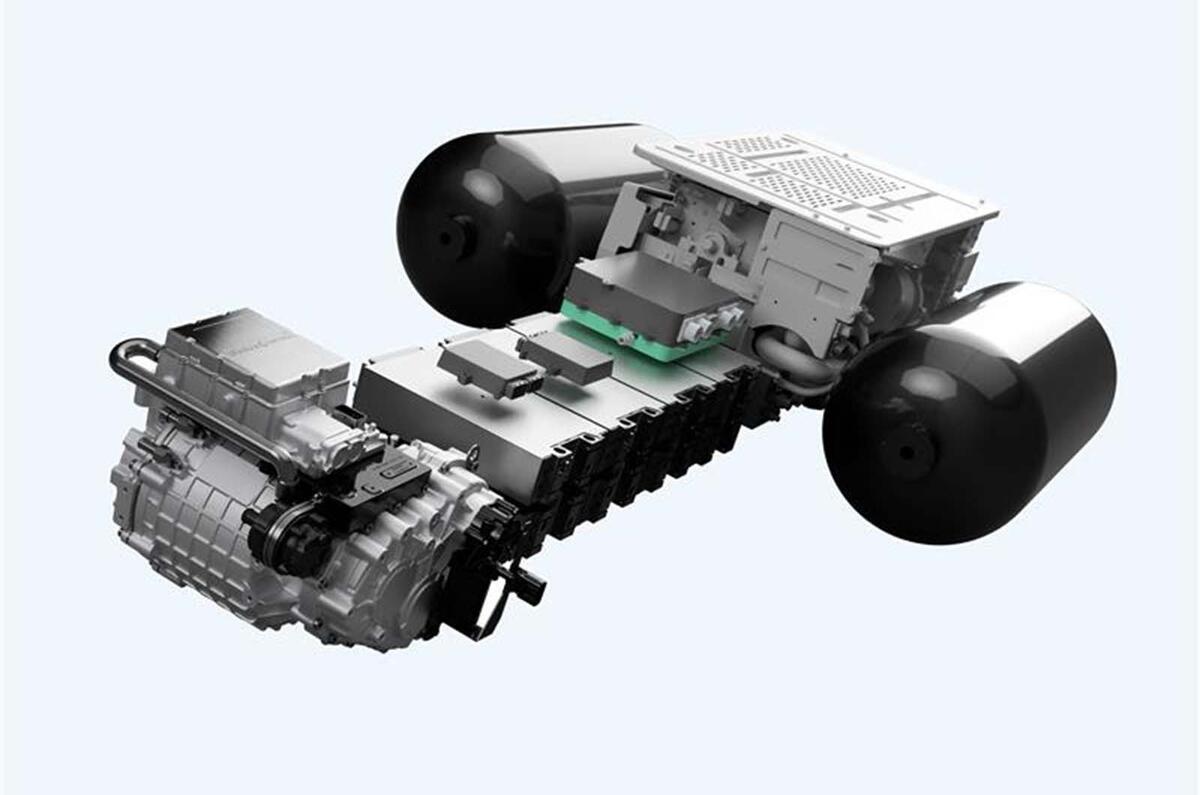The first off-the-shelf hydrogen powertrain has been developed by UK engineering firm Viritech and is targeted at manufacturers that are looking to "rapidly deploy" FCEVs.
The powertrain, named VPT60N, has been created to demonstrate the advantages of FCEV technology over conventional electric powertrains.
Primarily for use in prototype and development vehicles, the system is designed to be as flexible as possible and can be used in road cars, light commercial vehicles, diggers and tractors, according to its developer.
Although the system is not road legal off the shelf, Viritech says it can work with manufacturers to homologate the powertrain.
Viritech CEO Timothy Lyons said: “The launch of the first powertrain in our vehicle powertrain family realises years of hard work at Viritech. We are excited to make available to OEMs and tier-one manufacturers a viable, available and easily integrated fuel cell powertrain which enables vehicle manufacturers to accelerate the delivery of fuel cell vehicles on and off highway.”
The powertrain uses a 60kW fuel cell working with a 16kWh 400V battery. Both are combined with an electric motor producing 268bhp and 302lb ft.
It is likely to use a modular version of the firm's Graph-Pro technology, which means it has built-in mounting points to enable it to be fitted to the chassis of an existing vehicle without the need for additional framework, which reduces weight.
It also makes the pressure vessel - where the hydrogen is stored - especially robust to the point where it can withstand significant forces, such as in a crash. The hydrogen is kept in two containers that are pressurised to 350 bar.
Both the storage unit and battery can be reconfigured to suit a particular vehicle. A standardised unit pre-configured by Viritech is also available and will be used for vehicles that need to be developed and launched quickly.
The total range it provides is unspecified, but it is likely to draw learnings from the firm's Apricale hypercar, which targeted a range of around 500 miles.
The powertrain was developed at the MIRA proving ground in Warwickshire, where the UK firm has been able to use the expansive testing units on site, thereby saving on the considerable cost of building and homologating its own facilities.








Join the debate
Add your comment
I assume that the reason for wanting a Hydrogen fuel cell vehicle is for environmental reasons. It follows then that you will be wanting to use green hydrogen rather than hydrogen derived from hydrocarbons (oil). Why not just continue with petrol then, it's no more polluting and even more convenient than trying to store hydrogen! You won't want hydrogen derived from methane either as you have a better fuel in the methane already. Also, going to the trouble of cracking it to make the hydrogen will be more polluting than simply burning the methane. This only leaves electrolysed hydrogen (or green hydrogen), the only way to get hydrogen that is not more damaging to the environment than burning fossil fuels. (Unless we can find a natural deposit of hydrogen in the earth, which I believe is possible). The issue with electrolysed hydrogen is the expense. It might be economically viable where price isn't such an issue (aircraft maybe?), but who is going to pay for four times the electricity it takes to drive 100 miles in a BEV for the convenience of producing enough hydrogen to go the same distance?
That's efficiency and pollution dealt with, then there is storing the tricky blighter..... another story for another day perhaps....
One or two tanks storing Hydrogen at 5,000 psi+ - no thanks!
And where are you going to get your fuel from? - the few UK hydrogen stations all seem to be closing.
And the article is about?, yes, well, here's the question, stand by, should there be an alternative, a choice of an equally carbon neutral fuel?, so you, we have a choice?
Is your keyboard faulty.